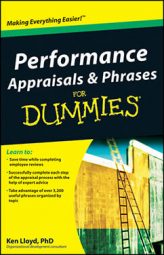Effective performance appraisals require managers to have considerable insight into their employees, but this task is virtually impossible for managers who lack insight into themselves. When self-awareness is lacking, managers easily miss the main event when appraising their staff and focus on performance issues that are secondary, off the mark, or simply meaningless.
If you want to carry out excellent performance appraisals, you need to address your self-awareness and, if necessary, do some building in this area. One of the most valid and effective sources of information that can strengthen your self-awareness is the feedback that you’ve received over the years.
One of the best ways to build your self-awareness is to carefully consider the feedback that you receive from the credible sources in your life. This doesn’t mean that you have to roll over every time someone says something about you that doesn’t sit well, but it does mean that you should truly listen to what others are saying and then try to make an honest judgment.
Your manager: Part of your manager’s job is to observe and evaluate your performance, which requires her to learn a lot about you. If you want to build your self-awareness, take this feedback to heart.
Your co-workers: Your co-workers have lots of data on your personality and performance. Their comments, insights, and suggestions are definitely worth considering.
Your friends: When you’re with your friends, you’re free to be yourself — certainly more than you are in the workplace — which means that your friends see a much wider range of your behaviors. As a result, when friends give you feedback, it’s worth hearing.
Your family: Your family knows you in an entirely different context, but — like it or not — your family does know you.
Professionals: If you’ve taken any tests during the employment process — including tests in such areas as personality, math, reading, job knowledge and aptitudes, and even physical abilities — go back and look at that data. If you’ve ever met with a career counselor or mental health professional, take a second look at what he said to you as well. Because these are professional observations, they merit some extra observation from you.
Yourself: The messages that you give yourself will provide you with some of your most compelling self-insights. Listen to what you say to yourself during the course of the day. Each message gives you one more piece of useful data.
If you pause to look at your behaviors and listen to your own messages, you can gain significant insight into your confidence, self-image, ethics, attitude, self-control, communication skills, interpersonal skills, energy, and much more.

